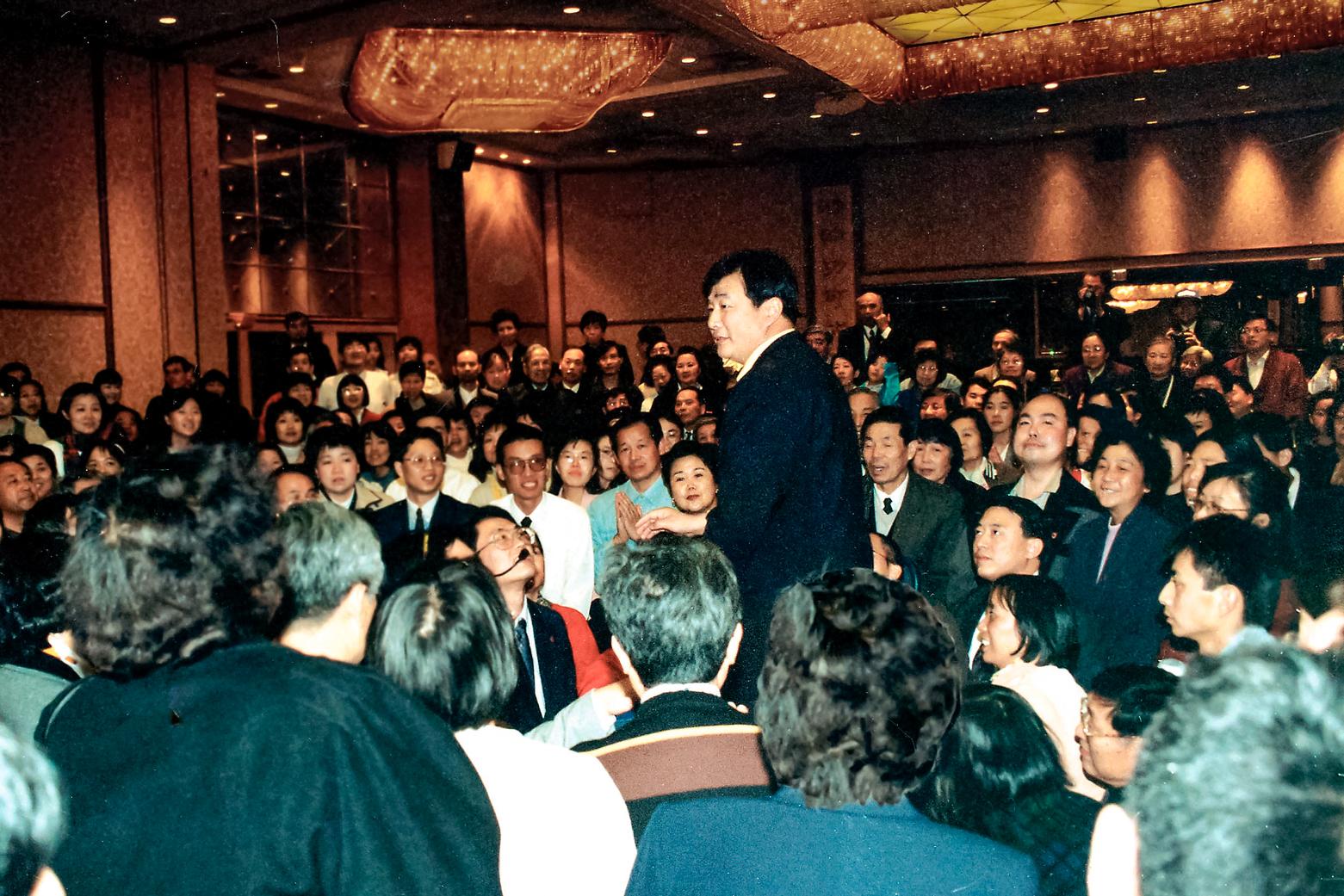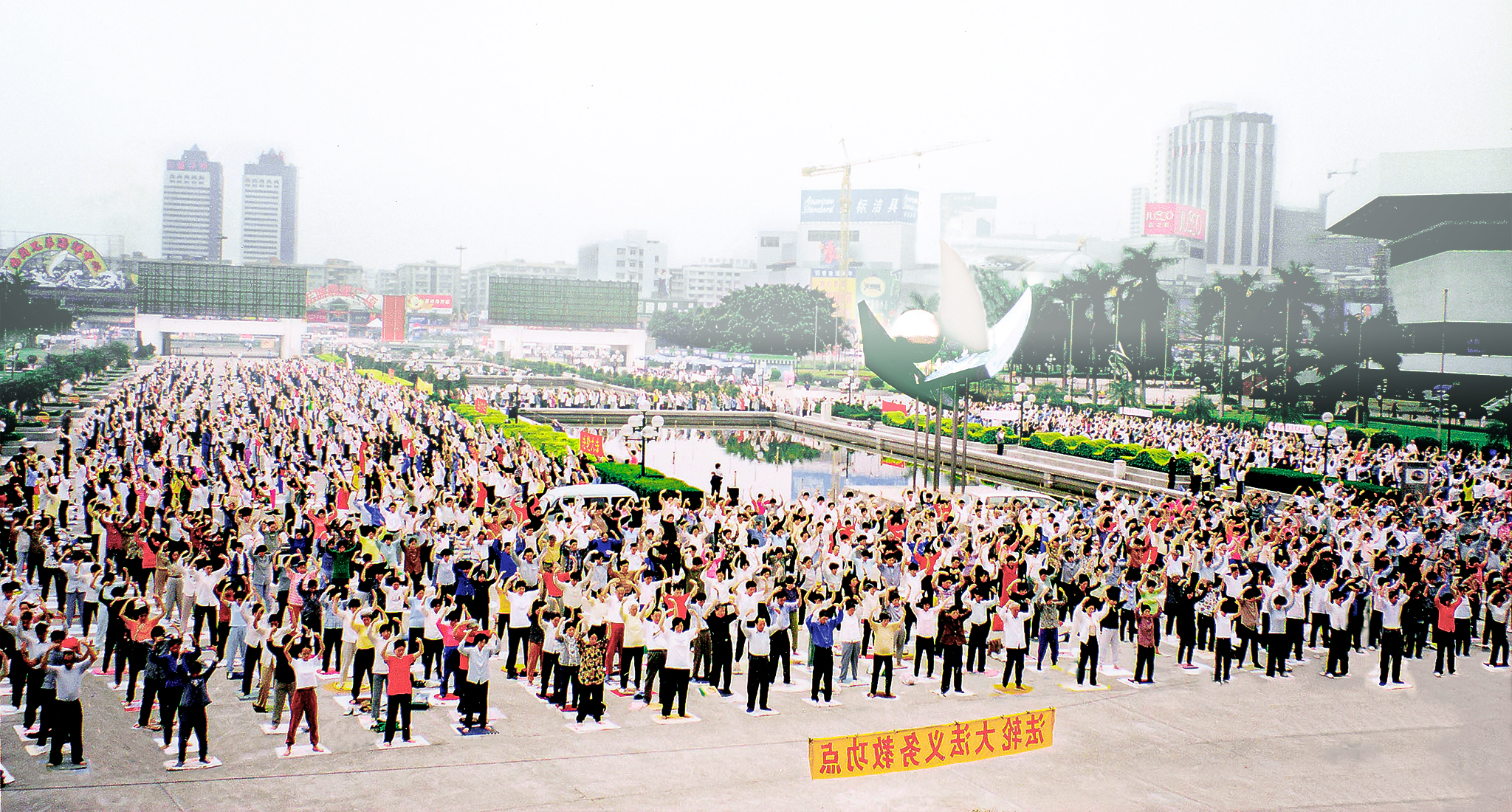In a spiritual desert left by decades of atheist communist rule, one faith in China rose to fill the void, inspiring tens of millions in the years to come.
That faith is Falun Gong, or Falun Dafa, a spiritual practice that came about in the early 1990s as people in the country began searching their past for deeper meaning.
In a few short years, it spread by word of mouth to every corner of the country, with upward of 100 million people practicing by decade’s end.
And it all started in a modest classroom in a northeastern city.
On May 13, 1992, Mr. Li Hongzhi walked up to a podium in a high school auditorium in his hometown of Changchun to address a crowd of around 180. It was his 41st birthday, a day that is now marked around the globe as World Falun Dafa Day. Each listener was handed a 12-page booklet titled “Falun Gong” that contained line drawings of meditative exercises. Each day after lecturing, for nine days, he demonstrated the moves in detail and walked around to correct each person’s posture.
Unlike most qigong masters and high officials at the time, Mr. Li spoke without a script. He carried just a small piece of paper inscribed with a few notes, glancing at it occasionally during the hours-long lectures.
Most of the attendees were longtime qigong devotees who had taken classes with many different masters, but Mr. Li struck them as someone different. Rather than focusing on energy healing, he expounded spiritual concepts in plain terms, addressing questions that many had had for years.
Soon, speaking requests poured in. Over the next two years, Mr. Li traveled all over the country and gave 56 seminars to more than 60,000 people. Those people then spread the word, and within a few years, roughly one in 13 people in a country of 1.3 billion had taken up the practice.

‘What I Was Looking For’
State bank loan officer Liu Yaqin attended one of the last seminars in July 1994 in the port city of Dalian.Throughout the class, Liu was so overwhelmed with excitement that she kept slapping the thigh of her friend beside her whenever something was said that struck her.
“I had a feeling that this was what I was looking for,” she told The Epoch Times.
After becoming a mother at 40, Liu suffered long-term complications and tired easily. But after the third day’s lecture, the two friends forwent the tram and instead walked the half-hour back home. From then on, Liu said, she felt like a different person; at some point, her chronic fatigue and ailments in her gallbladder and stomach all disappeared.
In 1998, a survey of around 44,000 Falun Gong practitioners across various parts of China found that between 95 and 99 percent of respondents reported health improvements through practicing. And more than improving physical wellness, the practitioners said, the faith had helped to reshape their character.
A month after Liu attended the lecture series, 20-year-old Korean Chinese Jin Chengquan joined around 4,000 others at a seminar in Yanbian, a region east of Changchun that is home to China’s largest ethnic Korean community.

Mr. Li’s teaching that “matter and mind are one and the same” stuck with Jin. If the two are interconnected, Jin said, it only makes sense that one’s inner world will reflect on the outside.
An emphasis on introspection and self-refinement is embedded in Falun Gong’s teachings, which are based on the principles of truthfulness, compassion, and tolerance. Part of that involves taking material gains lightly.
Later, as a stationary shop owner, Jin earned a supplier’s trust by doing exactly that.
Jin sourced products from a wholesaler an hour away by train. Once, Jin realized upon returning home that he had accidentally omitted a 350 yuan payment—then more than a month’s wages for the average Chinese person. China was still a cash-based society, so the seller was unaware of the matter, given the volume of daily transactions, and there was no way to trace the shortage to Jin.
When Jin handed over the money on his next visit, the supplier was shocked. “Where do you find people like this nowadays?” Jin recalled the business owner saying.
Growing Popularity
Mr. Li led by example. Dozens who attended these lectures described him as unassuming and affable, yet possessing a kind and charismatic appeal.Beijing native Ouyang Yan took her 6-year-old daughter to attend a local seminar in 1993. Upon seeing Mr. Li walk in, the girl declared that she “liked this uncle,” Ouyang recalled.
Her daughter had been diagnosed with ADHD and normally couldn’t sit still during class, yet she was fully present during these lectures. Later, in a packed subway, the two found themselves face to face with Mr. Li and his young daughter. Before Ouyang realized what was happening, her daughter ran toward the man she’d seen on stage and sat with him, beaming.

Mr. Li’s lectures always sold out swiftly, at times leading hosting venues to open up subvenues to meet the demand. During a 10-day health expo in Beijing in December 1993, volunteer assistant Mi Ruijing recalled that people were swarming the Falun Gong booth.
Despite his growing renown, Mr. Li didn’t capitalize on it for profit. He charged a nominal fee, the equivalent of about $10 or less, for the entire lecture series and gave second-timers a half-price discount; it was barely enough to cover costs. Even then, on more than one occasion, he donated the proceeds to charities and victims from disasters such as floods.
He kept a simple lifestyle, lecture attendees recalled.
More than one person who traveled with Mr. Li during the lecture tours recalled living off ramen noodles. Among them was Ye Hao, a retired senior police official. The group often topped their noodles off with the cheapest type of sausage, he said.
Ye recalled Mr. Li hand-washing his clothes and air-drying them overnight. Mi remembers noticing signs of wear on Mr. Li’s sweater and shoes, but “not a speck of dust.”
Mr. Li, according to Mi, always had a pleasant smile on his face. He was punctual—sometimes skipping meals to make up for travel time. If he needed Mi for anything, he would ask, “Can you do it? Is that OK?”

Through this, Mi said, she learned to modulate her own naturally high-pitched voice and speak to others in a gentler tone.
A Fresh Start
One spring day in 1993, Han Lianxiang came across a handful of people holding up their arms in a meditative position in a park near her home.Not knowing what it was, she raised her hands to mimic their pose, and felt her hands warming. Within weeks, she and her teenage son, Hu Yang, were both in Dalian’s Jiche Gymnasium, in the same lecture hall where bank loan officer Liu experienced a change in her world view.
Any idle chitchat among the audience had died down by the second day. People stopped jostling for better seats and took lost valuables they found to staffers, who ensured the items were returned to their owners, usually by the next day. Han and Hu gave up their front-row tickets to some attendees coming from out of town.
Hu said he was grateful he encountered Falun Gong at a formative age.

Then 15, he constantly got into fights and hung out with neighborhood kids who would steal things to buy cigarettes. Han said she was sure he would have ended up in jail at some point.
Despite his previous behavior, Hu said, the values imbued in the practice quickly took root in him. His family marveled at his 180-degree turn, remarking on the sudden courtesy and thoughtfulness they’d never seen in him before. He picked up household chores without being asked, greeted neighbors, and cheerfully carried heavy items for them up the stairs.
“It’s like everything started anew,” he told The Epoch Times.
The once domineering Liu spoke of a similar shift in her personality.
She used to shout to get her way and allowed no dissenting views in the house. After learning Falun Gong, her husband would remind her of the words “truthfulness, compassion, and tolerance” as soon as her temper flared up. She immediately got her emotions in check.
“I can’t just keep bossing people around—I should hear what they have to say,” she told The Epoch Times.
In “Zhuan Falun,” a book compiled from Mr. Li’s transcribed lectures that became a national bestseller in China, Mr. Li speaks of maintaining a heart of kindness as a buffer when running into sudden conflicts.
George Miao came across such a test of his character on a train ride back from the southeastern city of Guangzhou in 1994.

In front of Miao’s family and friends, his sister started faulting him for how he ran his packaging printing factory. Feeling humiliated, Miao shot back, then checked himself after a few sentences, reminding himself to consider the merit of her words regardless of how they were delivered. They quickly made peace.
A Turning Point
Word of the practice and its benefits spread like wildfire.Wang Yuguang, from one of China’s northernmost cities, Jiamusi, said more than 100 people in her extended family started practicing Falun Gong after she began.
In a public park near her home, she set up a music player to play the Falun Gong exercise music. Within a month, hundreds had joined her for meditation exercises each morning. The group grew so big that they soon split into two.
The trend was the same elsewhere.

China’s capital alone had hundreds of Falun Gong exercise sites. Walking around Beijing on a weekend morning, one would see hundreds of people doing Falun Gong exercises in public parks and open plazas, Ouyang and Mi said.
Along Chang'an Road, a major Beijing thoroughfare, they were such a sight that “whenever buses passed by, all eyes were looking out the windows,” Ouyang said.
Chinese Communist Party (CCP) officials initially encouraged people to take up the practice. In 1995, the Chinese Embassy in France invited Mr. Li to Paris to talk about the practice and arranged for the country’s first week-long Falun Gong seminar.
Chinese state-run outlet Dalian Daily in 1997 carried a story on Falun Gong practitioner Sheng Lijian, a man over the age of 70 who built four roads in a local village using money from his own savings. Yangcheng Evening News, in November 1998, ran a cover story on a 5,000-strong Falun Gong exercise site, featuring photos of a 2-year-old and a 93-year-old practicing on its front page.

That positive story in 1998 turned out to be one of the last in China.
The following April, in 1999, police in the megacity of Tianjin, near Beijing, beat up and arrested dozens of Falun Gong practitioners who were asking for a retraction after an article attacking the practice was published in a state-run magazine.
Tianjin practitioners went to city officials to appeal the arrests. They were told to go to Beijing to make their case.
Mi suffered from scabies and a stomach perforation while in detention and lost three-quarters of her stomach as a result. She eventually escaped China and settled in New York.

Since 2000, Mr. Li has been nominated four times for the Nobel Peace Prize. More than 25 members of the European Parliament nominated him for the Sakharov Prize, which honors those who dedicate their lives to human rights and freedom of thought.
Each year on May 13, officials worldwide issue greetings to commemorate World Falun Dafa Day, the anniversary of the introduction of Falun Gong; they also take the opportunity to condemn the ongoing abuses targeting the faith in China.
“I will continue to push to get this passed through the Senate, to get it signed by the president, and will always fight to protect religious freedom for every one of my constituents,” he said.
“To the people of China, Falun Dafa provides a source of strength in the face of oppression,” the resolution states. To millions around the world, Falun Gong has brought “better health and inner peace.”
Ouyang, who attended Mr. Li’s lectures 32 years ago in Beijing with her daughter, commented on how Falun Gong has helped tens of millions to be a better version of themselves.
She worked in the administration at a state university. After leaving the role, she learned that her boss had thought of her as “the best person in the workplace.”
If not for the persecution, many more would likely have joined the practice, she reflected, adding, “Then how much better would China be?”




















